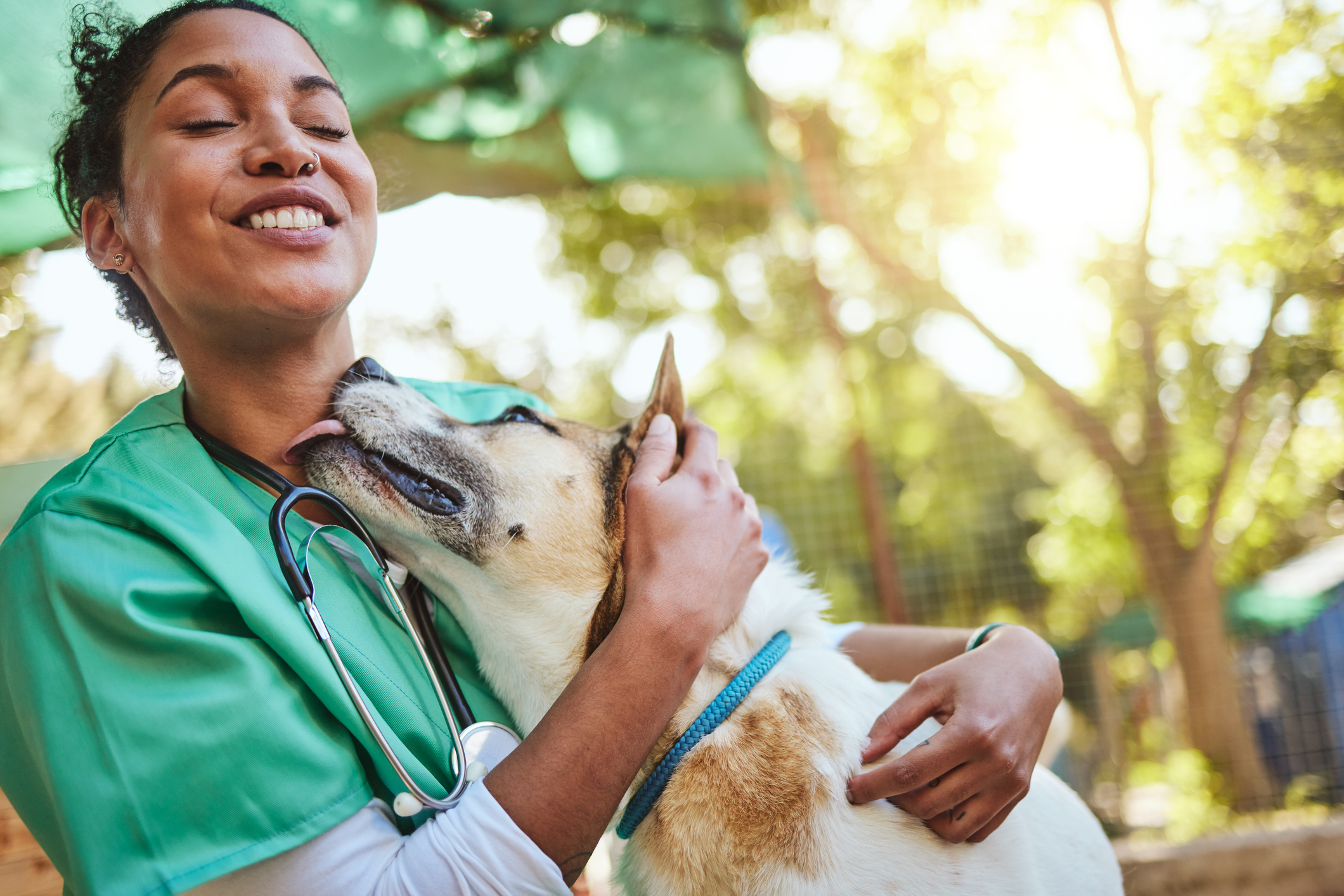“You vets are just in it for the money. You don’t care about animals or their suffering.”
How often do you hear this? Once, you felt a profound sense of pride in your chosen career. You knew the risks but extolled the benefits of being a veterinarian.
You believed your passion for animal welfare would carry the day.
BUT, maybe you’re not so sure anymore. And why?
You’ve euthanized many pets you wanted to save.
Your patients are often sick or dying, and you stare into their eyes knowing you can’t save them.
Pet parents scream at you for charging diagnostic fees or requiring upfront payment for surgeries.
Before you give up, ask yourself: do you remember why you became a veterinarian?
After the time and effort you’ve put in, you deserve to remember “why” before you ask “what’s next?”
Today, contemplating these 10 reasons to be a veterinarian may help ease the emotional turmoil of decision-making.
The 10 biggest benefits to being a veterinarian
One of the greatest benefits of being a veterinarian is the joy of caring for animals that accept you without judgment and, in turn, having a positive impact on their lives.
Other great reasons to be a veterinarian include:
1. Contributing to animal health and welfare
Many people think the “perfect vet” is one who charges little and is always up for providing free care – like National Geographic’s controversial Dr. Pol. However, the celebrity vet is actually on probation for negligence during a 2013 canine ovariohysterectomy.
Cheap care comes with consequences.
As a veterinarian, your days are filled with triage procedures, emergency surgeries, and euthanasias.
Yet, the world’s animals can’t do without you. In the U.S., the Banfield Pet Hospital is predicting as many as 75 million pets without veterinary care by 2030 – if veterinary professionals like you leave the industry.
In addition, a chronic shortage of large animal veterinarians will have disastrous consequences for our global food supply, if not reversed. Your work caring for animals literally runs the world.
2. Contributing to public health through zoonotic disease prevention and control
Doctors, particularly veterinarians, are the first line of defense against animal-to-human infectious diseases like COVID-19.
In 2021, the World Veterinary Association (WVA) and Health for Animals recognized the American Veterinary Medical Association (AVMA) for its dedicated online COVID-19 Resource Center.
The center provided critical resources – including scientific summaries and informational videos – that helped veterinary professionals worldwide keep their pet patients and human families safe.
Since zoonotic diseases will comprise 75% of emerging infectious diseases, veterinarians like you play a central role in protecting human and animal lives.
3. Making a difference in both clinical and non-clinical settings
In 2021, Dr. Emily Dozeman co-founded Philadelphia Animal Speciality and Emergency (PASE).
Burnt out working in a corporate hospital setting, she started PASE to provide a patient-focused approach to emergency care.
But is emergency care what’s fueling a visceral fight-or-flight response in you?
If so, take a page from Dr. Dozeman’s book: Reinvent your career by exploring your potential within veterinary medicine.
Instead of emergency care, consider non-clinical roles in academia, the civil-military humanitarian world, or even veterinary pharmacology. Volunteer for 7-day World Vets small animal, equine, or livestock management field projects.
There’s a lot at stake here. The work of experienced veterinarians like you is needed in both clinical and non-clinical settings.
4. Participating in humanitarian missions during global conflicts
Often, you may feel powerless to provide the level of care needed – especially when your expertise and recommendations are overlooked by distracted, overwhelmed pet parents.
One man, however, decided that he would remain relevant.
Dr. Amir Khalil, affectionately dubbed the war vet, rescues animals from war-torn nations.
Dr. Khalil has led emergency rescue missions on behalf of FOURPAWS International for 29 years. Each mission is planned with obsessive military precision.
His latest mission? Braving snipers and missiles to save frightened zoo animals in Gaza.
If you aren’t interested in something quite that dangerous, volunteering for humanitarian missions with FOURPAWS or organizations like Veterinarians Without Borders will tap into your deepest values and strengths…
…helping you carve out a satisfying existence doing what you love best.
Still, if you have little appetite for such a drastic change, you can still reconnect with your “why” by:
-
Visiting local farms
-
Going on a whale watch
-
Sponsoring a puppy being trained as a medical detection dog
-
Signing up for the FREE world-class disease surveillance training for vets, courtesy of the Asia-Pacific Consortium of Veterinary Epidemiology
-
Attending veterinary conferences in the U.K. and USA while earning CE credits
-
Spending two weeks or more volunteering for EU animal welfare projects or global veterinarian charities
5. Working in a high-growth industry with career flexibility and opportunities for advancement
The global veterinary medicine market size is projected to grow at a compound annual growth rate (CAGR) of 8.3% from 2024 to 2030.
In the U.S., The Bureau of Labor Statistics estimates that employment growth for veterinarians from 2022 to 2032 will be a healthy 19.7%.
Meanwhile, job growth is also set to explode in the EU. The highest-paid veterinarians will be in education, research, or public service.
In particular, those making in excess of €100,000 annually will provide telemedicine or emergency care.
The sky’s the limit in veterinary medicine: new career paths are opening in mobile ultrasound, food safety and inspection, and in-home euthanasia services.
6. Being part of a community that offers a unique sense of camaraderie and solidarity
Making friends and forging strong support networks can make you feel less isolated. If there are no support groups where you live, consider joining the global Veterinary Support Personnel Network, where you’ll interact with over 37,000 colleagues from all over the world.
AND, best of all, it’s FREE to join.
A supportive network can help you forge new paths of resilience and strengthen your resolve to stay – should you decide to do so.
7. Creating a positive impact on human-animal relationships and societal well-being
The human-animal bond is a source of joy and comfort.
You entered veterinary medicine precisely because of this.
When challenges beckon, you work closely with pet parents. You educate them about surgical procedures, daily care regimens, medications, and preventive measures.
Strong client-veterinarian bonds positively impact animal well-being worldwide:
- According to a Human Animal Bond Research Institute survey, 71% of veterinarians believe discussing the human-animal bond with pet parents is valuable.
- 80% of pet owners worldwide say that greater knowledge of the bond has encouraged them to maintain their pet’s health, especially through regular check-ups with their veterinarian.
Pets and their human parents rely on you for trusted advice. As a veterinarian, you naturally promote the human-animal bond.
You evaluate emotional support animals (making sure they’re free of behavioral issues and zoonotic diseases) and facilitate animal-assisted therapy sessions. Your work is invaluable in preserving human civilization.
8. Promoting a diverse, dynamic work environment
Yes, it’s true that the worldwide shortage of veterinarians is resulting in longer wait times and higher vet bills.
BUT, there’s an overlooked casualty: the pets themselves.
A creeping increase in the euthanizing of pets with treatable diseases is approaching tragic proportions.
According to Dr. Alea Harrison, the first Black woman to be appointed chief medical officer of Banfield Pet Hospital, the “demand outweighs the capacity. To provide quality care and create access for patients, we have to diversify our pipeline.”
In short, it’s going to take more veterinarians and the adoption of new technologies.
As a veterinarian, you’re part of a diverse, dynamic team of global professionals. You support diversity of experience and technological advancements like telehealth, IoT monitoring, and AI-powered diagnostic systems.
Let’s talk about telehealth: the global veterinary telehealth market is slated to grow from $3.74 billion to $4.48 billion at a compound annual growth rate (CAGR) of 19.0% (2023-2024).
Pet parents are overwhelmingly your biggest supporters in telehealth adoption: according to an ASPCA survey, 66% of pet parents would make more appointments if you offered the service.
Some heroes don’t wear capes: each year, veterinarians like you save countless animal lives by supporting diverse, dynamic solutions.
9. Participating in biomedical research and protecting research animals
More veterinarians are needed in biomedical research.
It’s a painful fact that the world of animal testing is fraught with abuses and that research animals have few legal protections.
The world owes a large debt to veterinarians who serve as principal investigators and attending veterinarians in biomedical research.
Other ways veterinarians like you are making a difference:
- Sign up your organization for membership in the European Animal Research Association (EARA), a platform dedicated to the humane use of animals in research.
- Join the National Association for Biomedical Research (NABR), an American non-profit dedicated to humane animal research.
- Join The European Society of Laboratory Animal Veterinarians (ESLAV), a forum that gives veterinarians a voice in discussing issues pertaining to lab animal welfare (open to all veterinarians regardless of nationality).
10. Educating the next generation of veterinarians
Last, but not least, veterinarians like you are repositories of wisdom.
As mentors for the next generation of veterinary professionals, you pass on invaluable life-saving knowledge.
In the U.S., if you’re a licensed AVMA member with at least one year of experience, you can apply to be a mentor with MentorVet Connect.
The 6-month program connects early-career veterinarians with trained mentors who provide both emotional and career-defining support. The entire membership experience takes place remotely.
If you’ve been in practice for at least 10 years, have 4-8 hours a month to spare, and want to get paid for your efforts, you may be interested in mentoring for Ready Vet Go.
You’ll connect with enterprising young veterinarians whose creative energy and fresh ideas will reignite your passion for your career.
The challenges are real – but so are the benefits
As a veterinary professional, you understand first-hand the challenges that come with the job.
- You have a steep debt obligation. The average debt load for veterinary school is $188, 853.
- You work in a high-stress, high-paced environment. Missed lunches and long hours are daily occurrences.
- Employee turnover is high, due to the high-stress work culture. In a recent survey, 91% of your fellow veterinarians say that having qualified support staff is their top concern.
- When pets die, their human owners aren’t the only ones who cry. Almost 40% of veterinarians suffer from euthanasia-related trauma.
- The constant influx of sick and dying patients is a form of vicarious trauma. Compassion fatigue is on the rise (from 5.3% in 2017 to 9.7% in 2021), and you’re no stranger to it.
There’s no doubt veterinary medicine, particularly in the area of employee retention, is in crisis-mode.
In the United States alone, the turnover rate is 23% (and rising), and the costs of attrition can range from $1-$5 billion. The AVMA stresses that clinics should focus on retention, while implementing team-building activities that instill a sense of belonging.
As can be seen, the benefits of being a veterinarian are many. You’re a powerful force for change – and your legacy will last long after you’ve exited the profession.
Amidst the exhaustion, code blues, and setbacks, never forget the difference you make.



.png?width=1080&height=1080&name=Reclaim%20your%20time%20with%20better%20software.%20(3).png)
